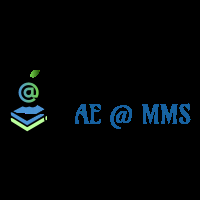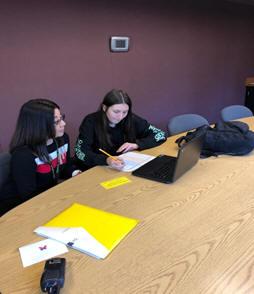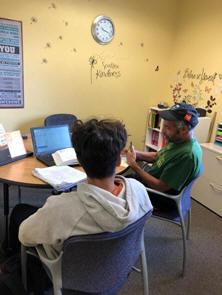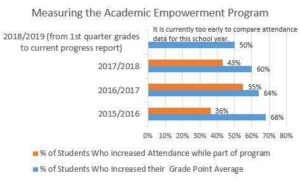
Academic Empowerment for Student Success
Vision
Pair middle school students who are at risk with adult volunteer mentors to improve their self-confidence, habits of mind (purpose, flexible thinking, communicating with teachers, organization) social responsibility, and a renewed interest in school.
Description
Academic Empowerment for Student Success matches adult volunteer mentors to middle school students who have a 2.0 or lower GPA with the goal of giving students struggling in school the tools necessary to become better learners. This program has successfully achieved this goal year after year by mobilizing parents and community members to serve as volunteer academic mentors for at-risk students in 6th – 8th grade at Moreland Middle School, Moreland School District’s comprehensive middle school in San Jose, CA.
Approximately 20-25 students on average per year choose to participate in this one-on-one opportunity which meets once a week. The program that builds much more than academic foundations. Academic Empowerment for Student Success gives students something they haven’t had before: self-confidence, “executive function” skills such as organization of materials, planning ahead, completing assignments; improved habits of mind (purpose, flexible thinking, communicating with teachers, social responsibility), and a renewed interest in school. In addition, students receive some academic support.
The program is coordinated by the Assistant Principal, school counselor, and AE (Academic Empowerment) parent leader. It is endorsed by the Moreland Public School District, and it receives $500 from the Moreland Middle School Home and School Club.
History
Started in the 2015/2016 school year, Academic Empowerment for Student Success is currently in its fourth year of providing students the academic tools and confidence to achieve beyond the classroom. The program started as a means to support students who didn’t qualify for any special program services, such as Special Education or Reading Intervention support, but who were failing classes and needed to learn how to organize, communicate with teachers, and advocate for themselves.
Initiated by a parent volunteer and Moreland Middle School’s Assistant Principal, Academic Empowerment for Student Success was born and focused its first year with just 25 middle school students and 11 parent volunteers as mentors. Teachers who want to recommend students for this program start with Moreland Middle School’s ISC/PSP (Initial Student Concern/Problem Solving Plan) process that generates a meeting of teachers and counselors and often initiates a recommendation for this program. Students must want to be matched with a mentor and be willing to put in the extra effort required. Students who raise their Grade Point Average to above a 2.0 and who have developed positive habits to maintain and grow their school career can exit the program; however, because of the caring adult support and developed mentor/ mentee relationships, often times, the students choose to continue to be part of the Academic Empowerment for Student Success program for the remainder of the school year.
Activities
Students:
Examples of student activities during mentoring sessions
Students are provided with basic school supplies by the AE tutors at the first session including: a backpack, binder, folders, dividers, pencil case, calculator, pens, pencils, highlighters, pencil sharpener, colored pencils, erasers, ruled notebooks, binder paper, graph paper, ruler.
Students are helped by the mentor to organize their binders at initial sessions.
-
- Tabs for each subject
- Dividers with pockets, place homework or forms that need to be signed in pockets
- Decorate cover of binder with inspirational or “feel good” image or message
- Students are supported with a Weekly Session Focus, all of which are reinforced at additional tutoring sessions
Students are supported with a Weekly Session Focus, all of which are reinforced at additional tutoring sessions
-
- Students create one empowering, good habit such as writing name on paper first, placing homework on top, or starting homework at the same time each day.
- Students create a time management plan for the week by designating a time for after school snack/chill time, homework time to include short brain breaks, dinner time, and rest time.
- Mentors help students prioritize tasks by due date, by the amount of time needed to complete a task, or by those tasks that can be completed quickly.
- Students practice communicating with teachers by email and/or in person.
- Mentor suggests pathways for solving a problem or answering a question such as who to ask, where to look online, what classroom resources are available, study groups or study buddies, or by attending Homework Lunch Clubs or other venues where help is offered.


Mentors:
Training: Mentors are provided with exemplary resources weekly so that they are supported and successful in their role, as well. After an initial training, mentors receive informational emails weekly from the program lead who guides mentors on successful student highlights, student incentive prizes paid for by the school’s Home & School Club or donated by staff, resource tips, and so much more.
-
- How are volunteer academic mentors selected? Mentors are selected for a student by matching a mentor’s skill set and availability to a student’s needs. Many students need help with basics like organization of backpacks and binders as well as planning weekly schedules. Most need someone to help them understand how to complete daily and long term work. They need help with all of their academic subjects such as: Reading, Science, Math, Writing, and Social Studies. Mentors are taught in their training that they do not need to “know” all the answers for the students, but that they need to help the students understand the importance of finding a path to the answers. They show them how to email their teachers when they have a question, or need to meet them after school. They support the student in reaching out to all the various resources such as: notes, homework clubs, peers, study groups, online textbooks, email, as well as how to ask a teacher for help.
- What does the initial training involve? In the initial training meeting of 1.5 hours, we cover the purpose and how AE began at Moreland Middle School, we show a video about mentoring, give them a focus for their first mentoring session, show them our schools online grading and homework program as well as the online textbooks. We show them how to use google classroom, give them a tour of the mentoring closet where all the supplies are stored, and go over some mentoring FAQ’s.
- Is there follow-up training, and what and how does that happen? The parent volunteer leader puts a focus for each week on the white board in the mentor room. Volunteers know they can to come see or email the Assistant Principal or volunteer leader with any questions or concerns. The Assistant Principal’s office is close to the mentoring rooms, and she often checks in with them to see how they are progressing with the student. Many mentors have worked with the program for more than one year.
- Is there a manual for the academic mentors? There is no current manual as the needs are unique to each mentee, but the mentors receive a “Weekly Tips” email from the AE lead. The Weekly Tips have a focus for the week; i.e. have your student compose and send an email to one of their teachers, or remind them about upcoming changes in the school schedule. In addition, the school counselor, Assistant Principal, and AE Lead are always available through email and personal visits.
Mentor recognition is important, and several opportunities take place. There is a celebration of mentors and students at the end of the year. Mentors are recognized by the School Board. Also mentors are included in staff celebrations, and they are given gifts at Christmas.

Classroom Teachers: At a problem solving meeting where all teachers come together to discuss concerns about their students, they then recommend students for the AE program. Teachers are aware that their AE students are working with tutors, and they provide on-going encouragement and support to the students.
Parents: Parents of AE student must give their permission for their student/s to participate. They attend a meeting about the program; they receive progress reports; and they are encouraged to contact the mentor if there are any questions or concerns.
Moreland Middle School Academic Empowerment Permission Slip
Dear Parents,
Your child ___________________ has been invited to attend the Moreland Middle School Academic Empowerment program. This is a program for students to receive tutoring on period one day a week. If you would like your child to participate in this tutoring opportunity, please fill out this permission slip and return it to the office.
Parent Signature:
Examples of parent updates
When Hailey started AE five months ago, she had four F’s. Fast forward to today, and Hailey will be able to hold her head high at graduation as she has fought her way up to A’s and C’s. She has one F . . . in Math . . . but has already completed 9 of 12 missing assignments and will be completing the remaining three by early next week. She has had a problem connecting with her teacher (Kilbourn) to receive credit for the 9 completed assignments. Hailey sent an email to Kilbourn today saying she would be stopping by after school today so Kilbourn could look at her notebook with the completed work.
Ana is going to finish out the year with a very nice report card. Her current grades are A’s, B’s and C’s . . . however, It is possible that one or two of her B’s may shift up to A’s and one of the C’s may shift up to a B over the next week. We shall see. I know she can do it. In fact, she is fully capable of becoming an A student.
Evaluation
Over the four-year life of Academic Empowerment for Student Success, almost 100 students have increased their academic performance, built a positive attitude toward school and developed critical mentor/mentee relationships to better develop their developmental assets. Early on, the program saw immediate results. One student, Mariah Gonzalez, a mentee in 2016/2017, became the student recipient of Moreland Middle School’s McCarthy Award at her promotion, an annual recognition for a student who “faced an (academic) obstacle and found the inner strength and determination to overcome this barrier to success.” Each year, the majority of students who are a part of Academic Empowerment for Student Success have not only shown an increase in their Grade Point Average from the time they begin the program to the end of the school year (see chart), their attendance in school increases (see chart).

In addition, students develop life-long, resourceful habits that will help them long-term, such as: accessing the volunteer-run homework center multiple times a week (a program developed because of Academic Empowerment); regularly communicating with teachers to assess their progress (teachers comment on the extraordinary benefit associated with this action); organizing their classwork and homework; and for the first time in their school career, turning in assignments. Because teachers are seeing these immediate benefits, there is a greater need for mentors to match with students.
2018-2019 Stats:
8 Mentors: 4 new and 4 returning
24 total students, 18 students in 8th grade, 6 students in 7th grade include 17 boys and 7 girls
15 Mentees currently in AE
Current Mentees have been in AE since the beginning of the year
10 Current Mentees joined AE between Nov and April this ye
2 Mentees improved grades and are no longer in AE
1 Mentee wanted to “try on his own” (ended AE with a 3.0 GPA)
6 Students were either not a good fit for AE or were placed in a different support program
Students with their Mentors measure their academic progress:
-
- On the Chrome Book, they do their Aeries Grade check weekly.
- In Aeries on the Chrome Book, they check the number of zeros.
- If a student is missing an assignment, has a question, or is confused about an assignment, he/she emails the teacher with the mentor, because this a skill that needs to be taught and reinforced.
Academic Empowerment for Student Success positively impacts student behavior and habits long-term. As 8th graders promote, and begin their high school career, Moreland’s feeder high school has reported that students not only seek out a similar program for self-accountability, In addition, students develop life-long, resourceful habits that will help them long-term, such as accessing the volunteer-run homework center multiple times a week (a program developed because of Academic Empowerment), regularly communicating with teachers to assess their progress (teachers comment on the extraordinary benefit associated with this action), organizing their classwork and homework, and for the first time in their school career, turning in assignments. Because teachers are seeing these immediate benefits, there is a greater need for mentors to match with students.
Mentors are provided with exemplary resources weekly so that they are supported and successful in their role, as well. After an initial training, mentors receive informational emails weekly from the program lead who guides mentors on successful student highlights, student incentive prizes paid for by the school’s Home & School Club or donated by staff, resource tips, and so much more. Academic Empowerment for Student Success positively impacts student behavior and habits long-term. As 8th graders promote, and begin their high school career, Moreland’s feeder high school has reported that students not only seek out a similar program for self-accountability, students come more prepared for the rigor of high school and beyond, a result of this life-changing program.
Recommendations for Replication and/or Adaptation
Mentor training is necessary.
Hold an initial informal training for mentors that includes:
-
- the purpose of Academic Empowerment,
- a focus for the first mentoring session, (see below)
- what resources are available such as textbooks and online classroom information,
- review of what a weekly session might cover,
- list Homework Lunch Clubs or other venues where help is offered,
- discuss student incentives if any,
- provide a tour of the mentoring meeting space along with where student supplies are stored.
- review how to access program coordinators
Provide weekly suggestions for mentors and opportunities for them to share information.
Students and Mentors
Program should provide a structured, consistent mentoring time and space.
-
- A student and mentor should meet on the same day and same time each week.
- Use the same meeting space stocked with basic items such as pencils, binder paper, textbooks, calculator, and computer.
Suggestions for first mentoring session of student and mentor:
-
- Mentors share a little bit about themselves such as hobbies, pets, favorite foods, or sports to help the student relax and get to know their mentor.
- Ask the student for one or two things they would like help with such as writing, math, science, time management, and organization.
- Provide school supplies as needed.
- Organize backpack and binder.
Provide award monthly incentives for students.
-
- Award incentives when milestones are reached such as when missing assignments are completed or a good habit has been consistently practiced.
- Incentives might be a front-of-the-line pass for hot lunch, gift cards, a “reserved” ball for recess, or leftover school t-shirts/sweatshirts from past years.
Cooperation and support of all participants including classroom mentors, students, classroom teachers, parents, and administrators is recommended. This includes communication between and among the participants on a regular basis.
Recognition of mentors as well as students creates motivation and helps to continue participation in the program.
Contact Information
Hilary Gill, Assistant Principal, Moreland Middle School
hgill@moreland.org
408-874-3306
